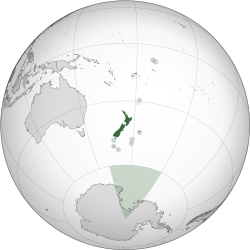New Zealand
From Wikipedia, the free encyclopedia
This article is about the constituent country within the Realm of New Zealand. For other uses, see New Zealand (disambiguation).
"NZ" redirects here. For other uses, see NZ (disambiguation).
| New Zealand
Aotearoa (Māori)
| ||||||
|---|---|---|---|---|---|---|
| ||||||
| Anthem: | ||||||
|
Location of New Zealand within the Realm of New Zealand
| ||||||
| Capital | Wellington 41°17′S 174°27′E | |||||
| Largest city | Auckland | |||||
| Official languages |
| |||||
| Ethnic groups (2013) |
| |||||
| Demonym | New Zealander Kiwi (informal) | |||||
| Government | Unitary parliamentaryconstitutional monarchy | |||||
| • | Monarch | Elizabeth II | ||||
| • | Governor General | Jerry Mateparae | ||||
| • | Prime Minister | John Key | ||||
| • | Governor General-designate | Patsy Reddy | ||||
| Legislature | Parliament (House of Representatives) | |||||
| Independence from the United Kingdom | ||||||
| • | Responsible government | 7 May 1856 | ||||
| • | Dominion | 26 September 1907 | ||||
| • | Statute of Westminster adopted | 25 November 1947 | ||||
| • | De jure independence | 10 December 1947 | ||||
| Area | ||||||
| • | Total | 268,021 km2 (75th) 103,483 sq mi | ||||
| • | Water (%) | 1.6[n 4] | ||||
| Population | ||||||
| • | 2016 estimate | 4,691,690[7] (123rd) | ||||
| • | 2013 census | 4,242,048 | ||||
| • | Density | 17.2/km2 (205th) 44.4/sq mi | ||||
| GDP (PPP) | 2016 estimate | |||||
| • | Total | $173.2 billion[8] | ||||
| • | Per capita | $36,950[8] | ||||
| GDP (nominal) | 2016 estimate | |||||
| • | Total | $169.9 billion[8] | ||||
| • | Per capita | $36,254[8] | ||||
| Gini (2014) | 33.0[9] medium | |||||
| HDI (2014) | very high · 9th | |||||
| Currency | New Zealand dollar ($) (NZD) | |||||
| Time zone | NZST[n 5] (UTC+12) | |||||
| • | Summer (DST) | NZDT (UTC+13) | ||||
| (Sep to Apr) | ||||||
| Date format | dd/mm/yyyy | |||||
| Drives on the | left | |||||
| Calling code | +64 | |||||
| ISO 3166 code | NZ | |||||
| Internet TLD | .nz | |||||
New Zealand ( listen (help·info)) (/njuːˈziːlənd/ new-zee-lənd, Māori: Aotearoa [aɔˈtɛaɾɔa]) is an island nation in the southwestern Pacific Ocean. The country geographically comprises two main landmasses – that of the North Island, or Te Ika-a-Māui, and the South Island, or Te Waipounamu – and numerous smaller islands. New Zealand is situated some 1,500 kilometres (900 mi) east of Australia across the Tasman Sea and roughly 1,000 kilometres (600 mi) south of the Pacific island areas of New Caledonia, Fiji, and Tonga. Because of its remoteness, it was one of the last lands to be settled by humans. During its long period of isolation, New Zealand developed a distinctive biodiversity of animal, fungal and plant life. The country's varied topography and its sharp mountain peaks, such as the Southern Alps, owe much to the tectonic upliftof land and volcanic eruptions. New Zealand's capital city is Wellington, while its most populous city is Auckland.
listen (help·info)) (/njuːˈziːlənd/ new-zee-lənd, Māori: Aotearoa [aɔˈtɛaɾɔa]) is an island nation in the southwestern Pacific Ocean. The country geographically comprises two main landmasses – that of the North Island, or Te Ika-a-Māui, and the South Island, or Te Waipounamu – and numerous smaller islands. New Zealand is situated some 1,500 kilometres (900 mi) east of Australia across the Tasman Sea and roughly 1,000 kilometres (600 mi) south of the Pacific island areas of New Caledonia, Fiji, and Tonga. Because of its remoteness, it was one of the last lands to be settled by humans. During its long period of isolation, New Zealand developed a distinctive biodiversity of animal, fungal and plant life. The country's varied topography and its sharp mountain peaks, such as the Southern Alps, owe much to the tectonic upliftof land and volcanic eruptions. New Zealand's capital city is Wellington, while its most populous city is Auckland.
Somewhere between 1250 and 1300 CE, Polynesians settled in the islands that were to become New Zealand, and developed a distinctive Māori culture. In 1642, Abel Tasman, a Dutch explorer, became the first European to sight New Zealand.[11] In 1840, representatives of the British Crown and Māori Chiefs signed the Treaty of Waitangi, making New Zealand a British colony. Today, the majority of New Zealand's population of 4.5 million is of European descent; the indigenous Māori are the largest minority, followed by Asians and Pacific Islanders. Reflecting this, New Zealand's culture is mainly derived from Māori and early British settlers, with recent broadening arising from increased immigration. The official languages are English, Māori and New Zealand Sign Language, with English predominant.
New Zealand is a developed country with a market economy. New Zealand is a World Bank high-income economy and ranks highly in international comparisons of national performance, such as health, education, economic freedom and quality of life. Nationally, legislative authority is vested in an elected, Unicameral Parliament, while executive political power is exercised by the Cabinet, led by the Prime Minister, who is currently John Key. Queen Elizabeth II is the country's head of state and is represented by a Governor-General. In addition, New Zealand is organised into 11 regional councils and 67 territorial authorities for local government purposes. The Realm of New Zealand also includes Tokelau (a dependent territory); the Cook Islands and Niue (self-governing states in free association with New Zealand); and the Ross Dependency, which is New Zealand's territorial claim in Antarctica. New Zealand is a member of the United Nations, Commonwealth of Nations, ANZUS, Organisation for Economic Co-operation and Development, Pacific Islands Forum, and Asia-Pacific Economic Cooperation.






